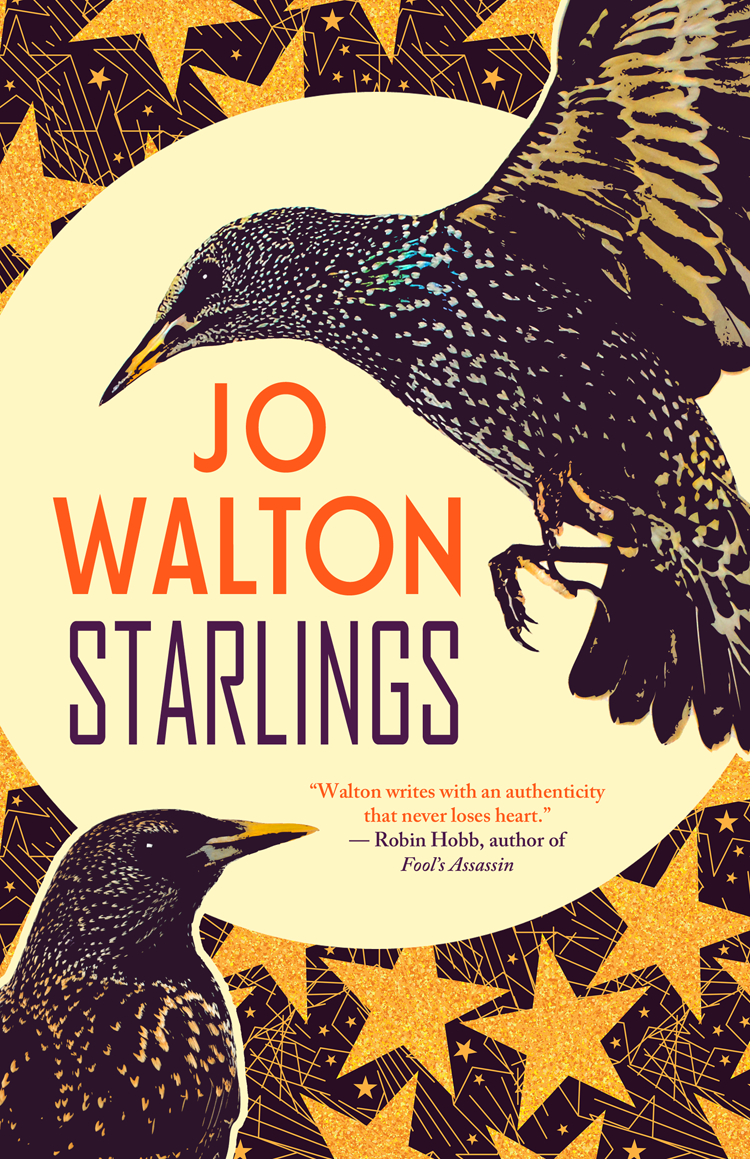Starlings by Jo Walton Book Review
Jo Walton's collection of short stories, poems, and a play is a must-read for science fiction and fantasy lovers.
Reviewing a book that is a collection of short stories is difficult, in that you have to evaluate the stories both individually and lumped together as a whole. What I can say first and foremost is that Jo Walton is a very good author. She’s written thirteen novels already, with a fourteenth, Lent, due this year. She has won numerous awards for her writing, including the John W. Campbell Award for Best New Writer in 2002, as well as Hugo and Nebula awards.
Starlings marks a departure from her usual repertoire. This is her first collection of short stories, a format she admits is more challenging for her than writing full-length novels. Her introduction helps form a complete depiction of what Starlings is all about. Walton writes that she didn’t know how to write short stories for the longest time, and it took years of practice and discussions with fellow authors until she figured out what short stories really were.
I kept that introduction in the back of my mind as I read, noting when I felt Walton had excelled in the short story form and when I thought more development was needed.
There were several pieces that really resonated with me. My favorite was the story of a coin, passed from person to person, telling each one’s story as it traveled and giving just enough backstory to flesh out the world in which the story takes place. The world building was admirable and so intriguing that I hope Walton eventually uses it as the backdrop of a future novel. “The Panda Coin” travels between various members in a civilization in space arranged in twelve sectors based on the months of the year. The socio-econonic realities of this world were illustrated by dividing people among classes who tried to move into the warmer “months” where the rent was high and life was better.
There were several short stories that retold fairy tales or mythology, even religious stories. These were always interesting points of view. Although I’ve tired of some of these re-told fairy tales in the past, I have to say Walton’s take on a Snow White prequel was beautifully handled, told from the point of view of a sentient magic mirror.
Walton also uses the tool of science and speculative fiction to provide discussion on topics like pain and loss. In “Joyful and Triumphant: St. Zenobius and the Aliens,” the patron saint of Florence tries to explain Heaven and the need for pain on Earth. One part really hit the nail on the head: “When you’re asked to intercede, when somebody prays to you, they are often asking to be relieved of pain. What you have to ask yourself is whether the pain is necessary for the story.”
That theme of pain is echoed in a later, unrelated story: “A Burden Shared.” It was a fabulous depiction of a world where transferring pain from a loved one to yourself is possible. A separated mother and father share custody of their daughter’s debilitating pain. In this world, it’s easier for someone else to bear another’s pain, than for them to have it themselves. There’s so much weight in the meaning behind this story, and there’s a twist at the end that is so good I can’t give it away.
There’s also a play in the book that’s quite good. “Three Shouts on a Hill” is an amalgamation of myths and legends, all smushed into the same quest story. There is a twist on this story too that must be experienced first hand, though the very end still perplexes me because I expected something a little flashier.
There were a few stories I didn’t connect with. I didn’t get the ending on “Relentlessly Mundane,” even though the build-up had me interested until that point. It felt like an unfinished story, and it referenced events that happened long before the events of the story that were far more interesting than the discussion taking place. You can’t tease me with mentioning these people saved the world and were blamed for the death of their friend without showing it to me. It’s like showing up to Narnia in the last chapter of the seventh book.

In all, Starlings is composed of twenty stories, a play, and a good heaping of poems. The stories vary in length, though most are quite short, at only a couple pages. A couple of the longer ones can sometimes seem a little slow, but the world-building and characters are so lovely you can forgive it.
I recommend Starlings to lovers of science fiction and fantasy who want bite-sized pieces to enjoy and savor. It’s an eclectic mix of themes and tones, some humorous and some dark, that will keep you guessing. Not all the stories will work for everyone, but then again who can please everyone? Certainly not St. Zenobius in Heaven, that’s for sure.
